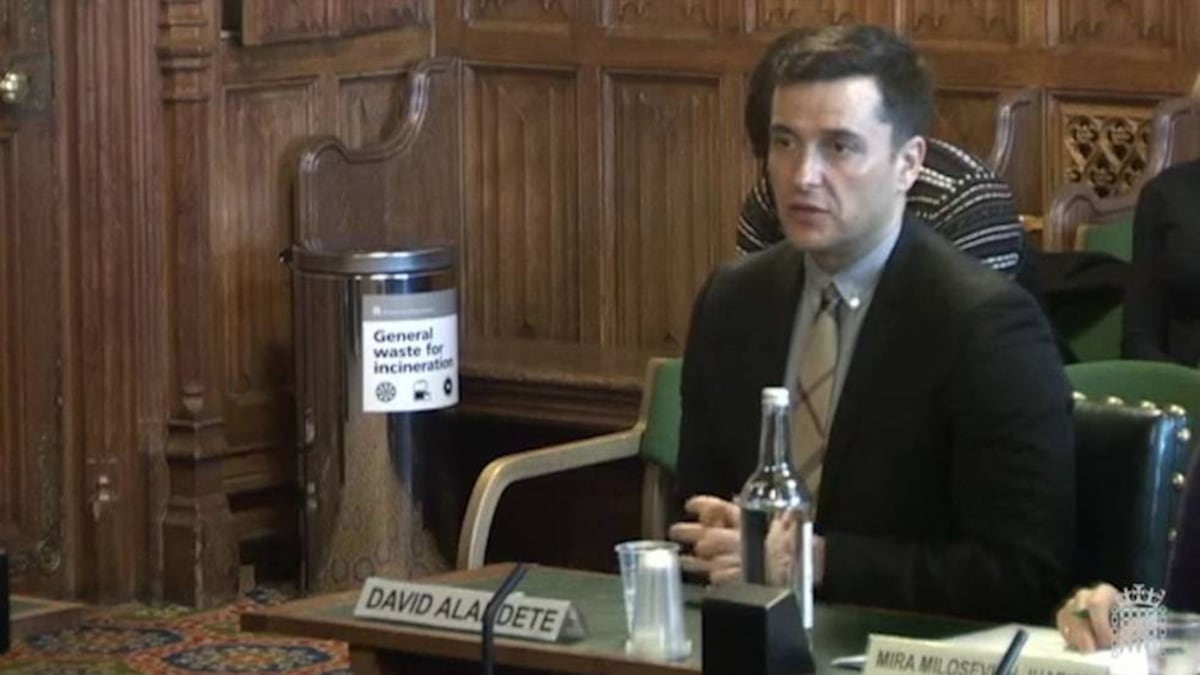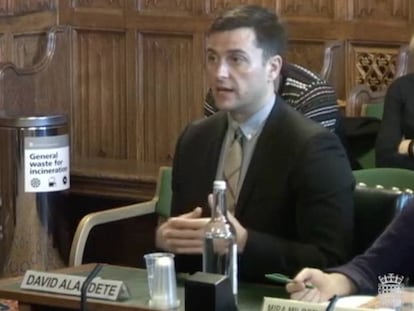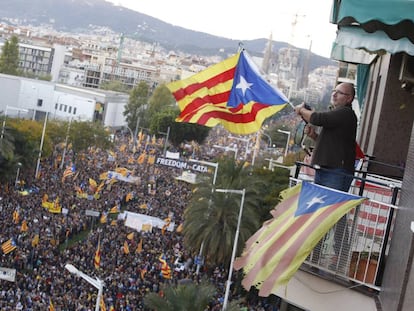¡°Russian public media spread Catalan pro-independence propaganda¡±
EL PA?S Managing Editor David Alandete explains coverage at UK parliamentary inquiry into fake news
A year ago, a British parliament committee launched an investigation into fake news, exploring evidence that media outlets with ties to the Russian government have tried to destabilize the European Union and NATO by disseminating disinformation. Brexit, the decision by the UK to leave the EU, could have been one of the effects of this campaign.
The members of the UK Digital, Culture, Media and Sports Committee ¨C five from the Conservative Party, five from the Labour Party and one from the Scottish National Party ¨C have already taken evidence from dozens of experts, scholars and journalists on the subject of fake news.
The committee considers that there has been a similar pattern between activities to interfere with the Brexit referendum campaign and with the push for Catalan independence. That is the reason why it called several Spanish experts in to testify on the matter on December 19, including EL PA?S Managing Editor David Alandete.
Ian C. Lucas, Labour MP: Do you have evidence that the Russian government is seeking to interfere with the referendum in Catalonia?
David Alandete: The only evidence I have as a journalist is that Russian state-affiliated TV organizations have been openly spreading propaganda that benefits those who want independence in Catalonia.
Ian C. Lucas: I think that¡¯s an interesting answer, because I am interested in the relationship between the Russian government and Russian-affiliated media. You talked about Sputnik.
D.A. Yes, which is fully owned by them.
I.C.L. So you think that¡¯s sanctioned by the Russian government?
D.A. Well, they are funded by the Kremlin and their editor-in-chief is Margarita Simonyan, a Russian journalist who is close to Putin. You can do research on her, see who appointed her. I would seriously look into RT and Sputnik and what information they do and what they cover here in the UK on all sorts of issues, because I think it¡¯s worth seeing. The US State Department has just requested that they register as foreign agents, and Twitter has banned them from buying advertising because it feels that it is propaganda, not ads for commercial issues.
The evidence session focused on media outlets financially supported by the Kremlin, and most particularly news coverage by RT, which operates on an annual budget of over €300 million according to Bloomberg, even though its TV audiences are extremely small. Both RT and Sputnik receive public funds from Russia, share an editor-in-chief (Margarita Simonyan) and operate in 100 countries and over 30 languages.
Samantha Bradshaw, Oxford Internet Institute: A lot of the junk news stories in the US election were peddled by groups like the alt-right, and extremist groups would be sharing the very highly polarizing content. We included WikiLeaks as highly polarizing content. A huge majority of the URLs being shared in the US came from WikiLeaks. I think that from known Russian sources it was about six or seven percent.
I.C.L. So six or seven percent of the activity was from Russian sources.
S.B. Six or seven percent of the highly polarizing content came from Russian sources, yes.
I.C.L. That strikes me as pretty high.
S.B. Yes. There were quite a few RT and Sputnik stories being shared in the American election.
During these sessions on political meddling by Russia, the publication of fake news by RT became patent. Its operating pattern was evidenced: using questionable sources with extremist opinions, creating news stories with a striking and manipulated headlines, and sharing content on social media with a high activity rate by bots and automated users. The following is an example of such behavior.
David Alandete: We went to the source. I will give you an example involving the UK. A news information by Sputnik was headlined: ¡°Why isn¡¯t NATO bombing Madrid?¡± This was shared on social networks. It was a piece about how Kosovo taught some lessons to the European Union, and this may sound like a familiar point because Putin made it very recently regarding Catalonia. The source, they claimed, was a former UK diplomat, which gave RT the grounds to use this headline. It became viral ¨C you know, NATO bombing Madrid? This UK diplomat is a former envoy to Uzbekistan. You know who he is? All right. Well, he is widely used by Sputnik, and whatever he says becomes a piece of news with a headline. I am a journalist and I know that ¡°Why isn¡¯t NATO bombing Madrid?¡± is not a headline, but for many people who are not very news-literate, it¡¯s worrisome. So just to summarize, this is what we saw, and we¡¯ve been seeing it very intensely, and it¡¯s only growing. I believe it¡¯s the same pattern that¡¯s been followed in other parts of Europe.
This type of campaign requires great technological groundwork and coordination, as experts at the session noted.
Mira Milosevich-Juaristi, Royal Elcano Institute: My hypothesis is that it is impossible to carry out such a complex operation with different instruments without support from a government agency. Of course I don¡¯t have material to prove it, it is a hypothesis, but I think we have to pay attention to previous events involving information wars in the UK, the US and so on. I think that no pro-Russian actor would do anything without authorization because Russia, as you know, is a centralized and authoritarian state, and I don¡¯t think any actor could act just freely.
Borja Lasheras, Head of ECFR Madrid Office & Policy Fellow: As for a pattern, I can only speak with a certain level of expertise on Russian disinformation operations, and there is indeed a pattern that I¡¯ve been trying to explain to your colleagues: in a way, it is confusing public opinion or contributing to confusing public opinion, polarizing discussions that are already highly divisive and polarizing, and mobilizing different sets of actors. In Spain, RT and Sputnik have been active in promoting this disinformation on Ukraine. The target has been the Spanish far left, with a relative impact if you look at voting patterns in the European parliament, but also the far right regarding the Putin brand as the epitome of social conservatism.
This inquiry is one of several public initiatives aimed at ending interference by RT and Sputnik, including an ad ban on Twitter, an announcement by Google that it will penalize these sources in their searches, the obligation to register as foreign agents in the United States, and sanctions by the British telecommunications regulator for publishing fake news in 2015.
English version by Susana Urra.
Tu suscripci¨®n se est¨¢ usando en otro dispositivo
?Quieres a?adir otro usuario a tu suscripci¨®n?
Si contin¨²as leyendo en este dispositivo, no se podr¨¢ leer en el otro.
FlechaTu suscripci¨®n se est¨¢ usando en otro dispositivo y solo puedes acceder a EL PA?S desde un dispositivo a la vez.
Si quieres compartir tu cuenta, cambia tu suscripci¨®n a la modalidad Premium, as¨ª podr¨¢s a?adir otro usuario. Cada uno acceder¨¢ con su propia cuenta de email, lo que os permitir¨¢ personalizar vuestra experiencia en EL PA?S.
?Tienes una suscripci¨®n de empresa? Accede aqu¨ª para contratar m¨¢s cuentas.
En el caso de no saber qui¨¦n est¨¢ usando tu cuenta, te recomendamos cambiar tu contrase?a aqu¨ª.
Si decides continuar compartiendo tu cuenta, este mensaje se mostrar¨¢ en tu dispositivo y en el de la otra persona que est¨¢ usando tu cuenta de forma indefinida, afectando a tu experiencia de lectura. Puedes consultar aqu¨ª los t¨¦rminos y condiciones de la suscripci¨®n digital.











































